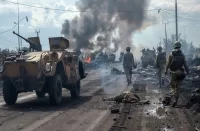The people of Libya are in deep trouble. Gaddafi is managing to retain his hold on the capital Tripoli and much of the west of the country and keeping under pressure the rebels who seem to have secured the eastern city of Benghazi thanks to the intervention of the UN Security Council sanctioned creation of the No-Fly Zone and the destruction by US and NATO aircraft of almost 40% of the equipment held by the Gaddafi forces and the disabling of Gaddafi’s air defences and his air borne military capability. The rebels are having however to defend vigorously the eastern city of Ajdabiya and have incurred tremendous losses in life and property while defending the key western city of Misrata and its port. Estimates are that more than a 1000 people have lost their lives in Misrata alone. Every day some 7000 people are crossing the border into Egypt and Tunisia. Now those crossing are not only the expatriate workers but also Libyans who have despaired of seeing peace return to their country or have not been able to sustain the pressures created by the raging conflict.
A state of civil war prevails and now military commanders and elsewhere who had perhaps naively assumed that Gaddafi and his cohorts would tamely hand over power and walk out, now concede that there is a stalemate that may last for months. Virtually all observers seem agreed now that despite the best efforts of participating members of the international community Gaddafi still has financial resources not only within Libya-there he is said to have about $ 70 million in cash and about $ 7 billion in gold bullion- but also abroad in the name of shell companies. His cohorts during the long years when Libya remained under sanctions developed the expertise and the network of agents that would enable a bye passing of sanctions. About 50 foreign embassies remain open in Tripoli, including those of Turkey, Russia, Bulgaria, Ukraine and China as well as sub-Saharan African countries and presumably many of them will have nationals that can do business with the pariah regime.
On the other hand the NATO powers that are now having to carry the brunt of the costs of imposing the no-fly zone, since the Americans have limited their involvement, are having difficulty in financing these operations and in addition are running short of the precision-guided munition that is needed to be able to attack such Gaddafi forces as are attacking civilians and doing so in non military vehicles. In fact the rebel to hold on besieged Misrata would have been very much more in doubt had the Americans not deployed two Predator UAVs that could precisely identify Gaddafi forces and knock them out even when they were in the vicinity of civilians and were not easily distinguishable from the rebel forces. In truth NATO does not have the weaponry that is needed in Libya and the US remains reluctant to become more deeply embroiled in a third war in the Muslim world.
Libya a relatively rich country had despite the vagaries and eccentricities of Col. Gaddafi made substantial progress in the 40 years of Gaddafi rule. This was a country with an annual per capita income of over $12000. It was a country in which illiteracy had been done away with and in which enough housing had been constructed to give most Libyans a comfortable home. It was a country in which while, according to one estimate, there was 30% unemployment there were also more than 2 million foreign workers of whom there was only a limited number who could not have been replaced by Libyans. It was a country with more than $100 billion in foreign exchange reserves and the 9th largest oil reserves in the world. Now it is my estimate that the damage to property and the loss imposed by reduced oil production will amount to $100 billion. If the civil war is prolonged as would appear likely the prospect are that the gains, fitful and uneven though they may have been, in the 40 years of Gaddafi rule will be lost and the Libyans will be pushed back a generation.
How did this sorry situation come about? With the benefit of hind sight it is clear that the powers that be in the UN Security Council and in the Arab League – driven in part by the revulsion with which Gaddafi was regarded and in part by the Gaddafi threats to treat like “rats” those who were fighting against him (Obama feared that there would be genocide), and in part by the belief that Gaddafi’s high level supporters would desert him – acted with unseemly haste and deployed the wrong tools.
To start with it was clearly wrong in Resolution 1970, “to refer the situation in Libya since February 15th to the Prosecutor of the International Criminal Court”. It was probably true that the actions Gaddafi took could be said to amount to crimes against humanity but the same could be said of the actions taken against peaceful demonstrators in Yemen or in other Arab capitals where what I and may others call the “Arab Awakening” had led to ruthless use of fore to quell peaceful demonstrators. Because no such reference was made there is the prospect that President Saleh of Yemen will step down and be granted immunity from prosecution sparing the Yemeni people the additional blood letting that was inevitable if President Saleh, with his back to the wall, felt that he had no option but to fight to the death.
Gaddafi of course has no such choice. Prime Minister David Cameron asked Gaddafi to read the writing on the wall and to step down but if Gaddafi can read only that by stepping down he will subject himself to the same sort of prosecution in the Hague as was rightly prescribed for Slobodan Milosevic, he has no incentive to step down. The same consideration would have been in the minds of his sons and close aides.
For these aides the treatment accorded to Moussa Koussa would have been instructive. It took weeks before the British were prepared to say that he would not be prosecuted for his part in the Lockerbie incident but by that time his colleagues had decided that defecting was not gong to improve their situation. Today there is talk that Gaddafi could probably find asylum in a country that was not a party to the International Criminal Court but in the meanwhile there have been more “crimes against humanity” and no country, not even sympathetic members of the African Union, who have benefitted from Gaddafi largesse, would be prepared to bear the opprobrium of hosting Gaddafi and his cohorts. After seeing in Egypt that President Mubarak who stepped down under the tutelage of the army of which he had been the patron and which had presumably given him guarantees of immunity from prosecution was now being prepared for trial Gaddafi must have felt that stepping down and staying in Libya was also out of the question.
For another it is now clear that the effort of the Gaddafi sons and their emissaries to strike a deal should not have been dismissed as summarily as they were. When political solutions are talked about this necessarily means that Gaddafi or his representatives have to be one of the factions in the negotiations that would lead to a solution.
Lastly should there have been greater attentions paid to the Russian and Chinese who abstained on UNSC resolution 1973 under which the No-fly zone was set up and military action to protect civilians from attack by Gaddafi forces is being taken. Their objections flowed, one presumes, from their reservations about interference in the internal affairs of a sovereign country that was a member of the UN. But I believe it flowed also form a better reading of the situation within Libya and their consequent belief that a no steps be taken that would close the door to a negotiated settlement between Gaddafi and his opponents.
Najmuddin A. SHAIKH spent 38 years in the Pakistan Foreign Service before retiring in 1999. Foreign Secretary from 94-97. A member of the Board of Governors of the Pakistan Institute of Strategic Studies, Islamabad. He writes a weekly column on foreign affairs in the “Daily Times” newspaper and is a commentator on the same subject on various TV and radio channels. Attends unofficial international conferences on issues of importance to South Asia on a regular basis. Lives in Karachi.
Source: Strategic Culture Foundation














Pingback: The Agony of Libya: What Can Be Done (II) | Oriental Review